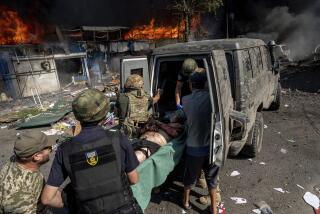An Invitation to Potential Fascists
- Share via
Serbia’s war against the Croats and the Muslims is analogous to the war that would be waged if an atavistically nationalist Russia should set out to unify all ethnic Russians, no matter in which post-Soviet republic they were living, by “cleansing” the affected territory of non-Russians. No one is stopping Serbia from “cleansing” post-Yugoslav Bosnia-Herzegovina. Would anyone stop Russia? The passivity of NATO and the United Nations before Serbian aggression says to potential fascists elsewhere in Europe--not least in Croatia, which has launched its own invasion of Bosnia-Herzegovina--that the path lies clear before them.
Austria, one of Yugoslavia’s nearest neighbors, is increasingly alarmed at the spread of a war that has created 2 million refugees. NATO has begun naval surveillance along the eastern coast of the Adriatic. But Austria’s ambassador to the United Nations has asked the Security Council to consider stronger measures--by implication, military measures--in light of Serbia’s “full-scale offensive in the north.”
There have been many ominous signs of a return to full-scale Serbo-Croatian warfare in northern Yugoslavia. A Serbian southern offensive against the majority-Albanian province of Kosovo is considered just a matter of time. Milan Panic, the Serbian-born American businessman newly inaugurated as president of Yugoslavia, says “ethnic cleansing is the disgrace of our nation” and promises peace.
Meanwhile, however, Radoman Bozovic, prime minister of Serbia, vows never to cede “one inch of territory” to non-Serbians. The Bosnian cities of Sarajevo and Gorazde, awaiting slaughter while the world watches, have reason to believe Bozovic and doubt Panic.
And yet, however atrocious the short-term and short-range consequences of the widening war, the long-term, long-range precedent is more ominous still. If the U.N. Security Council wishes to see future European ethnic conflicts resolved as this one is being resolved, then it should stay its present course of mild remonstrance and military inaction: Future aggressors will not fail to take the point. If, however, the United Nations wishes to establish the precedent that such aggression will ultimately hurt the aggressor most, then it should respond with alacrity to the Austrian request.
There are no insuperable legal obstacles to military intervention. Bosnia-Herzegovina’s president, Alija Izetbegovic, has made the most direct and impassioned pleas for just that. Forming a multilateral European ground force would take time, but clear steps in that direction, joined to demonstrative use of American air power in Serbia proper as well as in Bosnia-Herzegovina, might yet abort this ghastly rebirth of the Europe of Mussolini and Hitler. It may be Europe, in the first instance, that needs to send Europe a message, but America may yet be required for the transmission.
More to Read
Sign up for Essential California
The most important California stories and recommendations in your inbox every morning.
You may occasionally receive promotional content from the Los Angeles Times.













